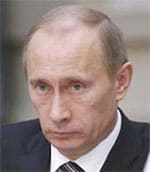RUSSIA
 |
|
Defending his legacy: Putin spends his way out of financial crisis. |
The Russian economy continued to slide down a slippery slope of economic crisis as a series of adjustments to the trading corridor of the ruble reflected a continued policy of gradual devaluation. The Central Bank of Russia boosted the refinancing rate in an effort to stem pressure on the currency, the defense of which has been chipping away at Russia’s foreign currency reserves at a frightening rate.
Although letting the ruble go would be political dynamite and effectively erase one of the most important accomplishments of the Putin era—particularly macroeconomic stability—some analysts suggest that the price of continued defense may wind up being too steep. Meanwhile, the Russian ministry of economy announced new macroeconomic forecasts that project GDP growth of 3.5% in 2009 (compared with an average of 7% over the past eight years) and a ruble exchange rate of 32 to the dollar, compared to 28 as of early December.
In a nationally televised question-and-answer session—continuing a tradition he established while president—prime minister Vladimir Putin tried to reassure Russian citizens that they would not fall victim to another financial crisis, promising that the state would pump billions of rubles into a wide array of social programs. He also dismissed rumors that he would resign as prime minister and/or that he might return to the presidency before elections in 2012.
In the latest reminder of the dangers of poor corporate governance in Russia, London-listed independent oil producer Sibir Energy announced in early December that it would assume an additional $340 million worth of distressed assets owned by major shareholder Shalva Chigirinsky, resulting in the shares losing more than half their value in trading the same day.
Kim Iskyan



